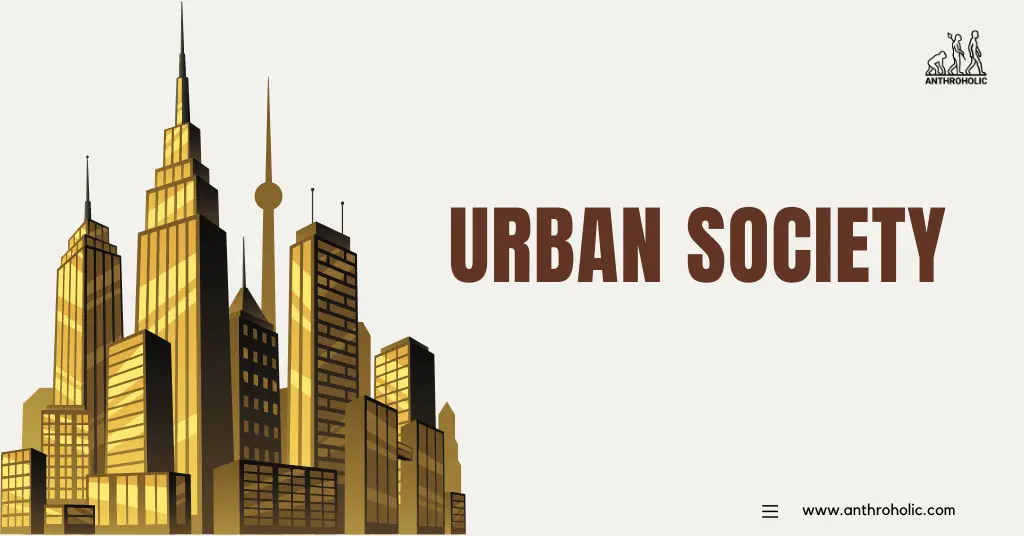AI Answer Evaluation Platform Live Now. Try Free Answer Evaluation Now
Urban Society
Urban society, the societal segment that resides in cities, has always been an intriguing subject for anthropologists. Its complexities, diversity, and constantly evolving nature provide a fertile ground for anthropological study.

The Characteristics of Urban Society
According to classic social theorists like Louis Wirth, urban societies possess distinct characteristics that set them apart from rural societies.
- Population Density and Diversity: Urban areas are characterized by high population density and immense diversity. Residents come from various ethnic, racial, and social backgrounds, contributing to a multicultural society.
- Social Differentiation: Urban societies are often marked by their social stratification and the existence of subgroups with their own distinct cultural identities.
- Anonymity: With the increased number of residents in urban societies, anonymity becomes a significant aspect. The urban dweller is often unknown to the majority of their neighbors, contrasting with the intimacy of rural communities.
The Emergence and Role of Urban Anthropology
Urban anthropology emerged in the 1960s as a subfield of anthropology. Its primary focus is the cultural and social patterns of urban settings.
- Understanding Urban Life: Urban anthropology attempts to unravel the urban life by understanding its structure, functions, and impacts on residents.
- Studying Urbanization and Its Impacts: It also studies the process of urbanization and its social, cultural, and economic impacts.
Urban Society: Challenges and Opportunities
Urban societies face various challenges but also present opportunities for anthropological studies. A table representation below illustrates these aspects.
| Challenges in Urban Society | Opportunities in Urban Society |
|---|---|
| Rapid urbanization leading to overcrowding and resource scarcity. | Urbanization provides diverse cultural perspectives due to the influx of different cultural groups. |
| High levels of social differentiation may lead to social exclusion and tension. | Presence of varied social groups creates a rich field for anthropological studies. |
| Urban anonymity may cause alienation and societal fragmentation. | Anonymity can foster individualism and freedom from restrictive traditional norms. |
The Anthropological Approach to Urban Society: Case Studies
Anthropologists use various methods to study urban societies. Two common methods are Ethnography and Comparative Analysis.
- Ethnography: Ethnographers immerse themselves in the urban setting to understand the everyday life and culture of the people. For instance, Ulf Hannerz’s exploration of urban life in Washington D.C. provides valuable insights into the complexities of urban societies.
- Comparative Analysis: This involves comparing urban societies across different cities or regions to discern patterns and differences. An example is the comparative study conducted by Sharon Zukin, examining the transformation of urban spaces in New York, Paris, and Tokyo.
Urban Society in the Digital Age
The advent of digital technologies has further complicated the social dynamics of urban societies. The virtual world has started to intersect with the physical one, resulting in an entirely new urban experience.
- Digital Divide: Access to digital technologies has become a marker of social and economic inequality. The disparities in access to digital resources, commonly referred to as the ‘digital divide’, can often exacerbate existing social inequalities.
- Smart Cities: The concept of smart cities, where infrastructure and services are connected and managed through digital technologies, is changing the traditional understandings of urban life. This offers opportunities for greater efficiency but also raises questions about privacy and data security.
- Virtual Communities: The rise of virtual communities has blurred the geographic boundaries that traditionally defined urban societies. This phenomenon has reshaped relationships, identities, and sense of belonging.
The Role of Urban Anthropology in Policy and Planning
Urban anthropology not only contributes to our understanding of urban societies but also informs policy-making and urban planning.
- Policy-Making: Anthropological studies can uncover the social dynamics and community structures of urban societies, which can inform policies aimed at addressing social inequality, promoting integration, or enhancing community engagement.
- Urban Planning: Anthropologists can provide valuable insights into how people use and perceive urban spaces, which can be used to design more inclusive and sustainable cities.
Future Directions
Urban anthropology will continue to be a vital field as cities evolve and become more complex. Future research will need to consider factors like:
- Climate Change: How do urban societies respond to and shape the climate crisis? What are the social and cultural implications of climate change in urban settings?
- Migration: How do increasing rates of migration impact urban societies, and how can cities better accommodate diverse populations?
- Health and Wellbeing: With the recent pandemic experience, how does urban living impact health and wellbeing, and how can urban societies be made more resilient?
Conclusion
Urban society offers a vibrant and dynamic field for anthropological research. By scrutinizing its multifaceted features, challenges, and opportunities, urban anthropology continues to shed light on our evolving societies. With continued urbanization and the inherent complexities it presents, the anthropological study of urban societies becomes increasingly important for understanding our world.
References
- Wirth, Louis. “Urbanism as a Way of Life.” In The City, edited by Robert E. Park and Ernest W. Burgess. Chicago: University of Chicago Press, 1925.
- Gans, Herbert. “Urbanism and Suburbanism as Ways of Life.” In People and Plans, edited by Herbert Gans. New York: Basic Books, 1967.
- Castells, Manuel. The Urban Question. Cambridge, MA: MIT Press, 1977.
- Fischer, Claude S. “Toward a Subcultural Theory of Urbanism.” American Journal of Sociology 80, no. 6 (1975): 1319–1341.




